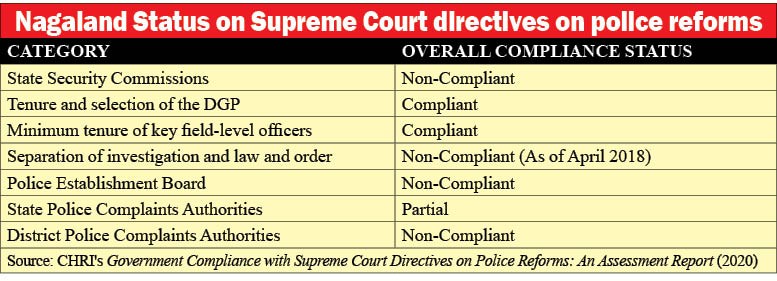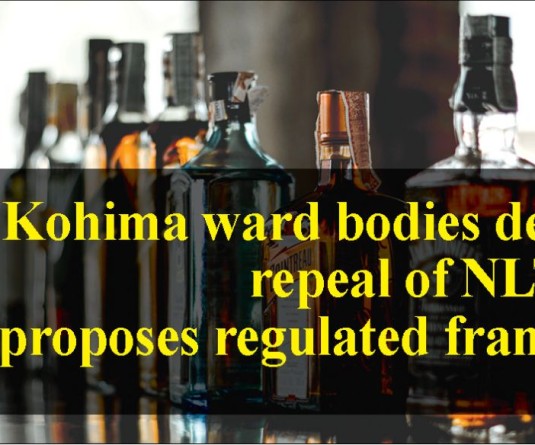
Not a single state or Union Territory fully in compliance with Supreme Court's directives, CHRI highlights
Morung Express News
Dimapur | September 21
Not a single State or Union Territory is in full compliance of Supreme Court of India’s seven directives pertaining to police reforms issued in case of 'Prakash Singh versus Union of India,' an assessment report revealed on Monday.
However, Nagaland was among the States/UTs with maximum compliance, though it was yet to fully comply with five out of the seven directives.
Overall, the Commonwealth Human Rights Initiative (CHRI) assessment report titled, ‘Government Compliance with Supreme Court Directives on Police Reforms: An Assessment Report (2020)’ noted that “not a single state, nor the Union Territories, comply with the directives in true earnest,” since the passing of the directives over a decade ago.
“States/UTs have blatantly rejected, ignored, or diluted significant features of the directives,” it added.
“The failure to comply with the directives reveals the extent to which elected governments are resisting police reform across the country,” the CHRI noted, while adding that the “needed checks and balances that the directives seek to instill to make policing more professional and accountable are being stymied in multiple ways.”
State Security Commissions
The first of these directives pertained to the constitution of a state security commission (SSC) with an aim to “ensure that the state government does not exercise unwarranted influence or pressure on the state police”.
In the case of Nagaland, an SSC has been constituted with the inclusion of the leader of the opposition as well as three independent members. However, it has not complied with the directive to provide an independent selection panel for appointment of independent members.
It also did not specify that the SSC’s recommendations are binding on them and or specify the requirement to prepare an annual report and table it before the State legislature.
“Absence of a categorical articulation of the SSC recommendations being binding on the respective government weakens the body and reduces its role to being merely advisory, rather than policymaking, as intended by the Court,” the CHRI noted.
Guidelines on appointment of DGPs
Nagaland and Arunachal Pradesh were the only states that fully comply with the second directive pertaining to the “tenure and selection of the DGP,” and provide a minimum tenure of 2 years and laid down grounds for removal “in line with the Court’s directive.”
As for compliance with the third directive that provided for a minimum tenure of two years for ‘Key Field-Level Officers,’ Nagaland along with six other states, fully comply with the directive.
Only 5 states - Andhra Pradesh, Arunachal Pradesh, Manipur, Nagaland and Tamil Nadu - include shortlisting by the UPSC.
Separation of investigation and law & order wings
While the apex court had ordered a gradual separation of investigative and law and order wings “to encourage specialization and upgrade overall performance,” the CHRI study stated that field-level assessment has not been possible. It reproduced observations of compliance “on paper” last compiled up to 2018 and said that it is “not measuring compliance with Directive 4 at this time.”
In this regard, Nagaland was among the 12 states failing to comply with the fourth directive as of April 2018.
Constituting Police Establishment Board
With regard to the fifth directive for setting up of a Police Establishment Board (PEB) within each police department, the study assessed that “all states, except Telangana, have constituted Police Establishment Boards on paper.”
The Board was to decide all transfers, postings, promotions and other service related matters for police officers of and below the rank of Deputy Superintendent of Police, however, only Karnataka and Arunachal Pradesh “comply fully with the directive in the composition, functions and powers of the PEB.”
Stating that the Court’s intention in this directive was to bring this internal decision-making firmly to the police leadership, the study noted that the political executive has retained control over decisions regarding transfer, posting and promotion of police officers across ranks, “when these fall squarely within the purview of internal management.”
Such practice further undermines “authority of the police leadership, affect morale of officers and blur accountability,” CHRI said.
Police Complaint Authorities
As for the sixth directive, which provided for establishing a Police Complaints Authority (PCA) at both state and district levels to “to look into complaints against police officers from the public in cases of serious misconduct and select types of misconduct,” the assessment said that 22 states, including Nagaland have constituted State PCA (SPCA) on paper.
Nagaland, However, is yet to constitute District PCA.
Nevertheless, the report noted that several states have constituted PCAs with “compromised composition dominated by members of the government/police, weakened authority and lack of independent expertise.” Accordingly, the CHRI pointed out that PCA would unlikely be able to emerge as an “effective remedy against police misconduct and brutality.”
Status of Police Acts
Meanwhile, the report revealed that a total of 23 states and two UTs have passed Police Acts/ Amendment Acts after the Supreme Court judgment, 2006.
However, in the case of Nagaland, Jharkhand, Madhya Pradesh, Manipur, Uttar Pradesh and Telangana, “efforts have been made to draft Police Bills which to date have not moved further,” it said.
Other UTs–Daman and Diu, Lakshadweep, Andaman and Nicobar Islands, Dadra and Nagar Haveli, and Puducherry–continue to be governed by the Police Act of 1861, it added.




